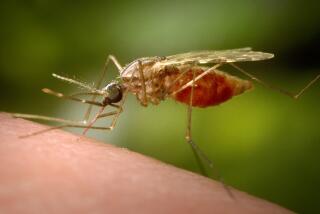Vaccine Against Monkey AIDS Virus ‘a Giant Leap’
- Share via
WASHINGTON — A new vaccine against a virus that causes AIDS in monkeys is a significant advance toward developing a vaccine to protect people against the closely related human AIDS virus, experts said today.
“The major significance of this work is that (it shows) a vaccine is possible for an AIDS virus,” said Michael Murphey-Corb, head of a team at the Delta Regional Primate Research Center in Covington, La., that developed the simian vaccine.
Researchers at the Tulane University research center said a vaccine made of whole, inactivated simian immunodeficiency virus (SIV) can protect rhesus monkeys against the virus that is a close, genetic relative of the human immunodeficiency virus (HIV) that causes AIDS.
Dr. Wayne Koff, chief of AIDS vaccine research at the National Institutes of Health, said the work by Murphey-Corb and her colleagues “is the most significant advance in the vaccine field since we started the AIDS vaccine program. It is a giant leap.
“This has dispelled any doubts about our ever being able to create a vaccine against HIV,” Koff said.
The study, he said, shows that the primate immune system can be primed to protect itself against a retrovirus. Both SIV and HIV are retroviruses that kill by destroying the immune system of the host, an attack that causes acquired immune deficiency syndrome.
A report on the study will be published Friday in Science, the journal of the American Assn. for the Advancement of Science.
Murphey-Corb said her team developed the monkey vaccine by purifying samples of the SIV and then killing the virus with a chemical called Formalin. This left the virus inactivated, but with all of its proteins intact.
This technique for developing the monkey vaccine could not be applied directly to humans, said Koff and other experts. The problem, Koff said, is that in using a whole virus it is difficult to be absolutely certain that every viral particle is killed when the vaccine is prepared. He said research may overcome this concern, however.
A number of candidate vaccines for the human AIDS virus are being tested, but they are based on specific proteins within the HIV and not on the whole virus.
In the Louisiana study, injections using the dead simian virus were given to nine rhesus monkeys that had not previously been exposed to SIV. Thirteen months later, the test monkeys and five control monkeys received powerful injections of live virus--shots that contained 10 times the amount of virus that earlier studies had shown was enough to produce simian AIDS.
“Of the control animals, all five became infected and three of them died within seven months,” said Murphey-Corb. “In the nine vaccinated animals, eight are not infected and nine of nine are clinically well.”





